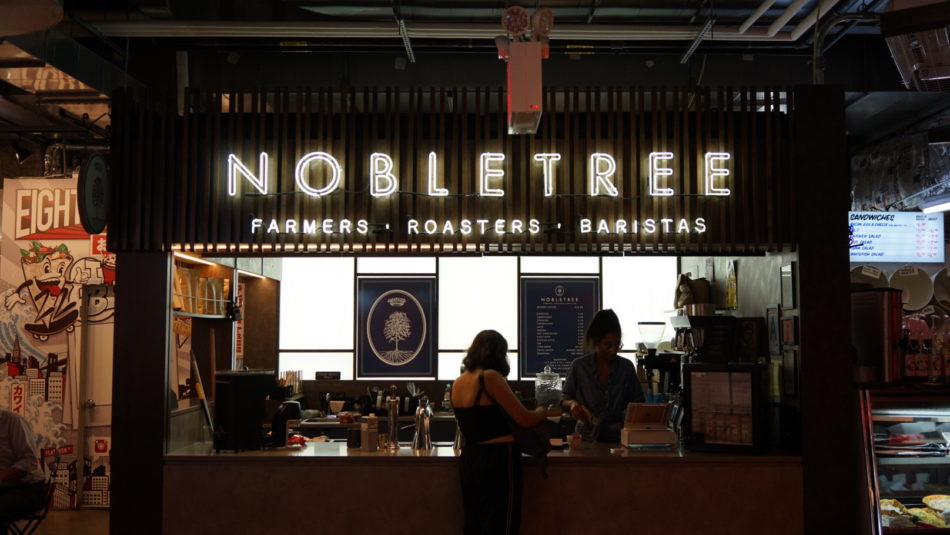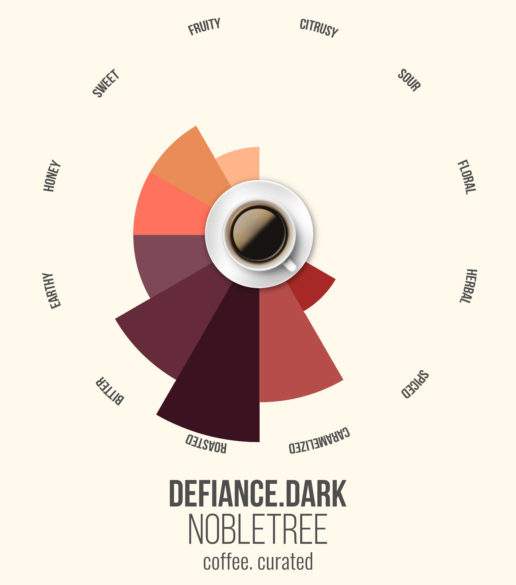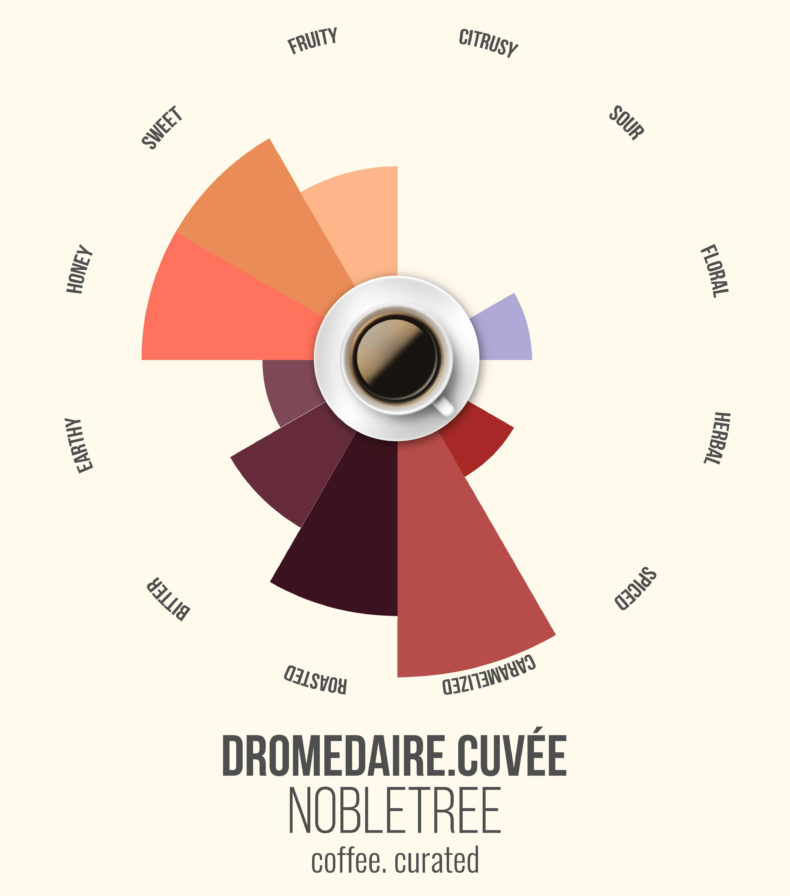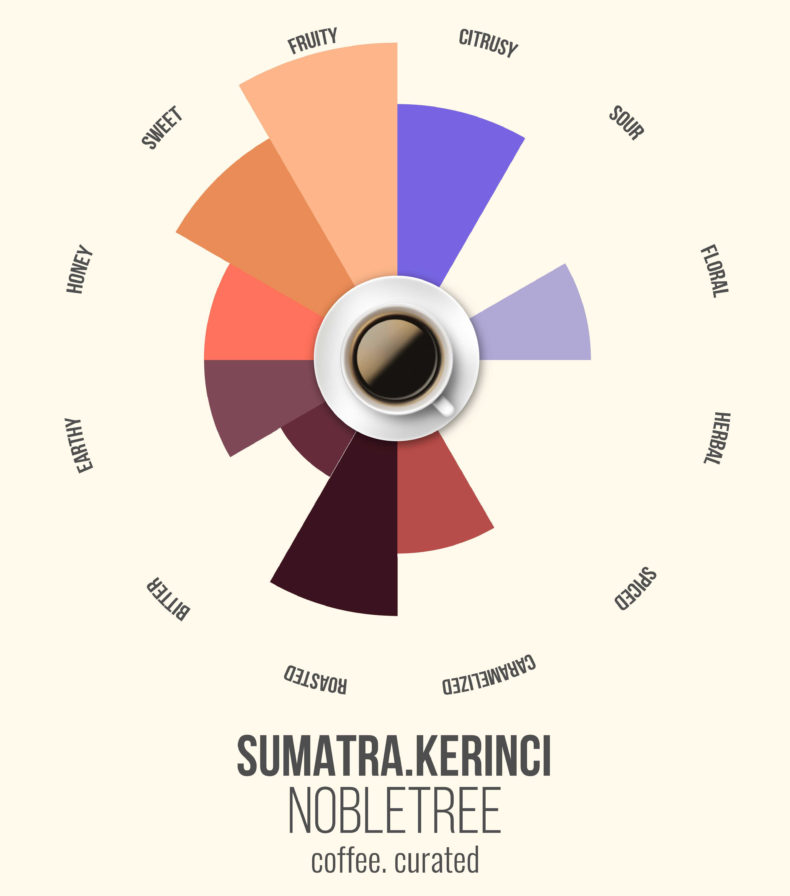“What I found, was an authentic voice in the coffee landscape, deeply rooted in the flavors and traditions of their Brazilian coffee heritage…” – Geoffrey Rickly, Nobletree, coffee. curated.
Nobletree Coffee is unique, even among the modern roasters of the third wave. Taking things a step further than even Columbia’s Devocion, they’re the only modern coffee roaster that controls and oversees every single part of their coffee production, from crop to cup, starting with the heritage coffee farms that they own: Fazenda Santa Izabel and Fazenda Monte Verde in Minas Gerais, Brazil. They transport their freshly harvested and wet-milled coffee cherries to dry mills that they own in both South Minas and Lower Mogiana in Brazil. At the dry mills, they continue to process the coffee(as well as the coffees of other regional farms that don’t own complex milling facilities, themselves) for shipping to their roasting facility, located all the way out on the end of a pier in Red Hook, Brooklyn.


For this Roaster Roundup, I met up with Maria Correa, Nobletree’s Sales & Marketing Director, to take a tour of their facilities, met Emma Bailey, the woman responsible for roasting their coffees and, finally, attended a cupping of their current line-up. What I found, was an authentic voice in the coffee landscape, deeply rooted in the flavors and traditions of their Brazilian coffee heritage but infinitely curious about the myriad of variations and techniques of coffee roasting and preparation, throughout the world.
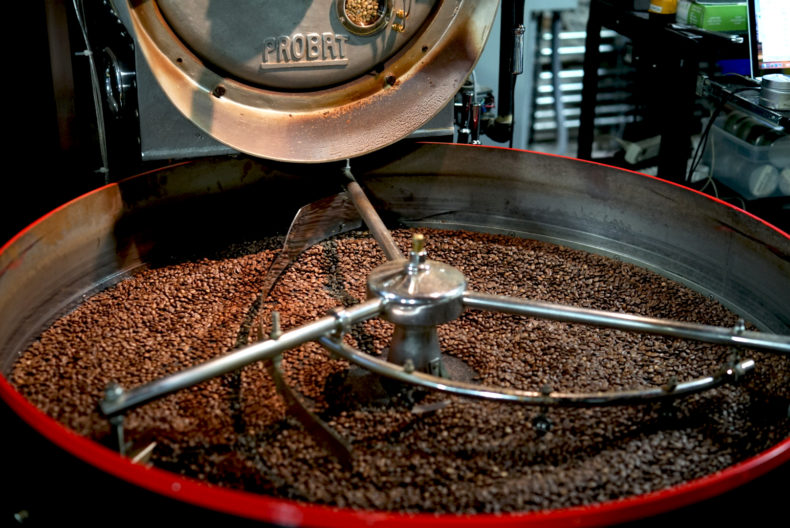
Nobletree’s mainstays are Brazilian blends, redolent of deep, nutty flavors; dark roasted sugars and complex, smoky overtones. Their house blend and espresso, both, balance flavors from the same family tree, attenuated only by the degree of roast and depth of flavor. This is fitting as both coffees were born of the same farms and roasted deeply in the hands of the same master roaster. Their third Brazilian blend is a French Roast — beyond dark to my palate — roasted hard until the flavors returned to the earth, steeped in the flavors of the soil: fig, date, roasted brazil nut. In the cupping, we discussed the trade routes and the influence of Brazilian coffee on Japanese roasting techniques, as well as the key to knowing when a French Roast has gone too far(according to Maria, the beans will be completely covered in oil, rather than speckled with it).
When we ventured into the fields beyond Brazil, Emma showed me the ways in which a Brazilian base-note can broaden a more acidic coffee, such as an Ethiopian. The Abertura, my favorite of the Nobletree blends, tastes like a pyramid: the broad shoulders of the dark, nutty Brazilian support the delicate floral notes and sharp, fruity flavors of the Ethiopian, without clouding up the coffee’s tasting profile. The sole single-origin coffee that we drank, a Sumatran, named Kerinci, seemed like a far-East rejoinder to the Brazilian terroir. It had the same shades of flavor but in a different color: rum soaked cherries and roasted almonds emerging from an earthy, spiced cup.
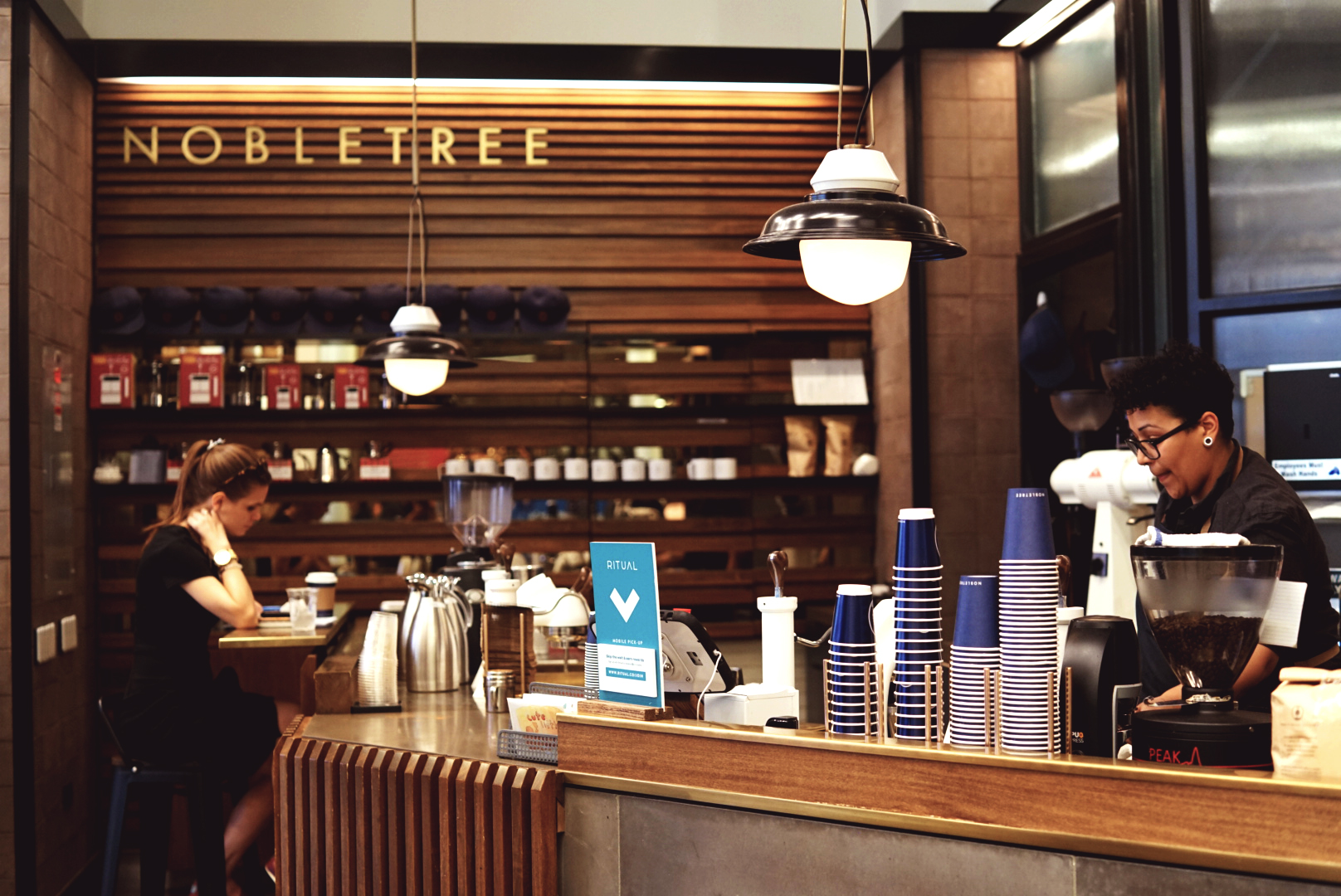
Nobletree’s mainstays are Brazilian blends, redolent of deep, nutty flavors; dark roasted sugars and complex, smoky overtones.
As we discussed which of the coffees were best black, which best took on milk with grace, I began to learn which of their beans needed a darker roast, which benefited from a light touch. Then we came to the pros and cons of blending, as well as various pulping and milling processes. After a while, I couldn’t help but notice the similarity between music production and coffee production. Each bean is like a different instrument, containing its own discreet, black notes. It gets played and processed, as we try to bring out the characteristics that we find most appealing. The roast is like amplification, where we turn the favored aspects up to the point where they break open and spill out something new. Only the best can make that something harmonious and desirable. Finally, we decide when to blend and when to solo. Different ears hear different things in different songs. Some of us enjoy solo work of a delicate nature. Others enjoy robust, aggressive compositions of a full band. So, too, with taste.
Whatever your preference, check out these coffees for something that suits you and definitely pick up a bag to support one company that’s doing something truly exciting.
Nobletree Coffee Roaster Roundup: Single-Origin Beans & Blends:
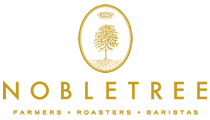
Brazil Defiance Dark Blend
Nobletree has a darker, more heavily roasted flavor profile than much of the coffee that I drink and none of their blends skew darker than the Brazil Defiance Dark blend. It showcases the deep charred flavors of a Brazilian blend pushed as far into the black as it can go, while still retaining the flavors rather than destroying them. Here, the sugars are caramelized and then cooked even longer so that the roasted, sweet flavors of almonds and hazelnuts transform into the nearly alcoholic flavors of the brown spirits: whiskey and dark rum, while the top notes turn from delicate tea and tobaccos into the robust burn of a fine cigar. Only the most hearty of us will enjoy this as black coffee: all-night drivers and pack-a-day smokers, the Turkish stove top revelers and Japanese canned coffee connoisseurs. But for anyone that takes their coffee with half and half, two sugars and a warm mug, rejoice! Defiance takes sugar well, its flavors opening, rather than being overpowered, transforming the bitter brew into a warming and welcoming treat, much like a black Russian or similarly sophisticated concoction.
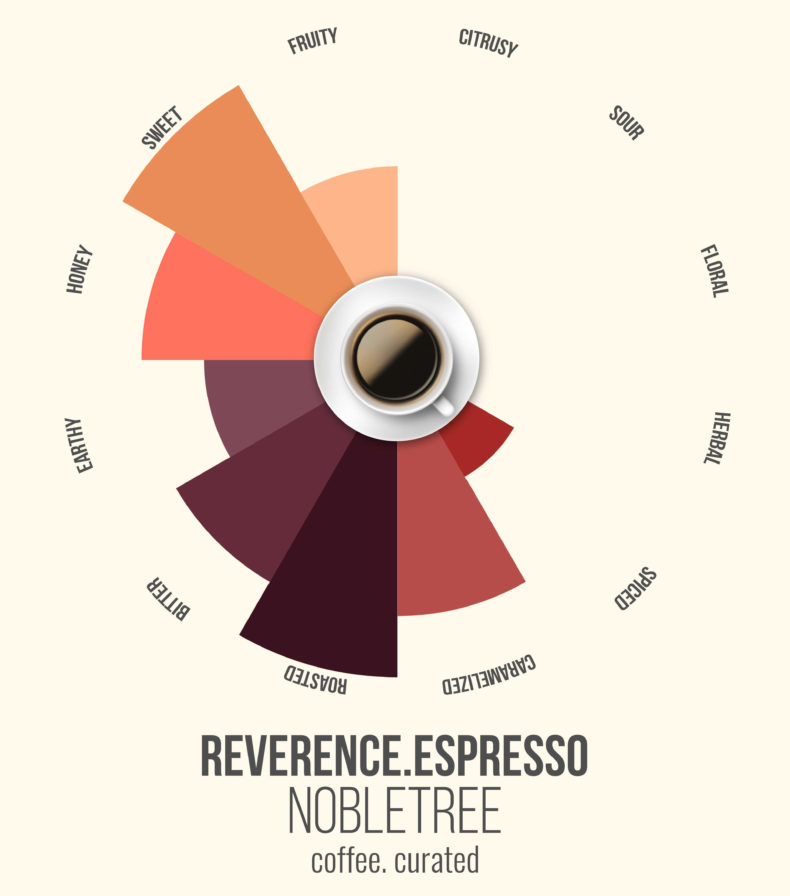
Brazil Reverence Espresso
Lighter by leagues than the Defiance Dark but still harder roasted and more intense than the Brazil Dromedaire Cuvée house blend, the Brazil Reverence Espresso is the clear highlight of Nobletree’s impressive and admirable operation. While the house blend showcases the approachable and delicious nature of the best Brazilian Coffee and Defiance Dark shows how well it takes a French Roast, the Brazil Reverence Blend offers the most pronounced signature flourish at Nobletree: an incredibly sweet and nuanced espresso that is an absolute knockout no matter how it’s prepared.
As a straight shot, best when pulled ristretto, the sweetness of the hazel-nutty-toffee-like coffee is extraordinary. The sweet nuance of an expensive aged bourbon, most reminiscent of the 10-year Pappy Van Winkle and it’s brûléed intensity. There’s intensity of flavor, presented as dark chocolate and a smooth, creamy mouthfeel, that they characterize as “marzipan truffle” and vivid liquor-like acidity, all moving perfectly over the tongue, coating the palate as it goes down. In a latte, the whole thing gets an extra layer of malty sweetness, as milk sugars form in the steam, releasing further levels of flavor. As a cortado or flat white, the espresso sits flat in the cup, grounding its flavor profile in the kinds of deep coffee tastes that Brazil is known for. As a cold brew, the coffee is smooth and well balanced, whether black or with cream, with slightly more intense flavors than the Dromedaire Cuvée cold brew.
Brazil Dromedaire Cuvée
The Brazil Dromedaire Cuvée represents the smoothest and lightest of the Brazilian blends, a perfect “all day coffee” for pouring from a French Press in stages or sipping as a cold brew. Though it takes milk well, I prefer this one black as none of the flavors are overwhelming. Instead, they take the hazelnut and caramel of the darker blends and distill them for suspension in a light presentation where they can all be seen clearly, enjoyed separately, one after the next. Here, the coffee is light and pleasant, a concentration of heat, focus.
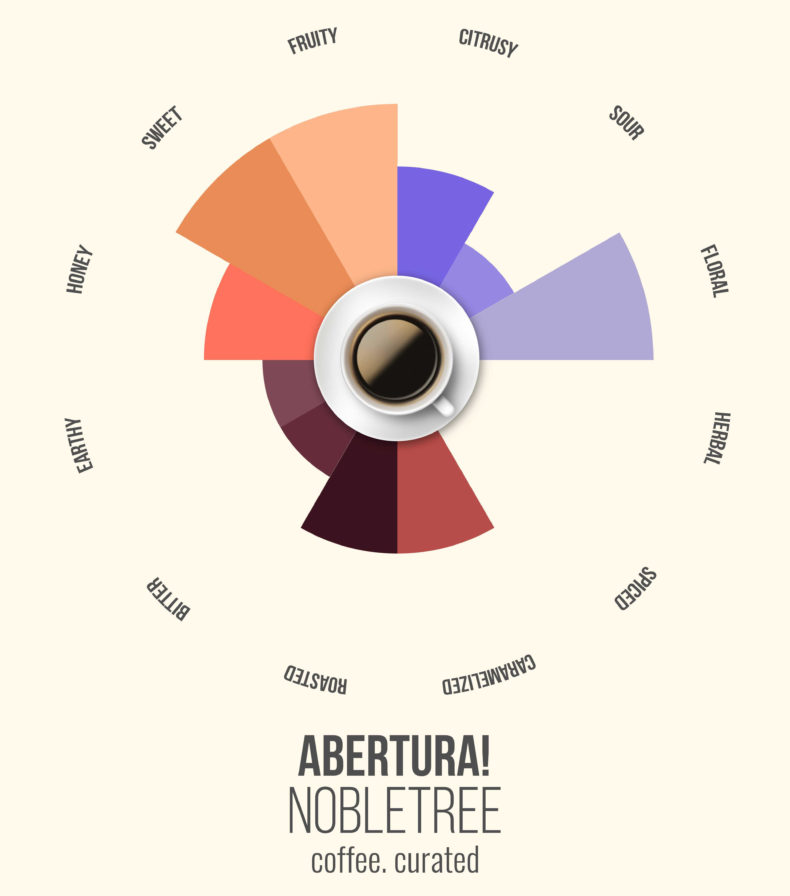
Abertura Blend
This blend of Brazilian and Ethiopian coffees was the biggest surprise of the bunch, for me. I’ve had blends comprised of a delicate, clean coffee like an Ethiopian with a bold one, like a Brazilian, that resulted in the utter demolition of the Ethiopian and the watering down of the Brazilian. But this coffee, prepared as a pour-over, french press or cold brew showed me an alternate world where the two coffees fit each other like pieces of a puzzle. The low notes of the Brazilian anchored the coffee, like the drums and bass in a rock band, giving the solidity and darkness of French nougat or sesame halva, balanced by the floral complex notes of oolong tea and violets, accented by bright fruity flavors of peach, lemon and even grape. The bag advertises cherry cola, vanilla, and sweet cream, and while those notes were present, they were the least of the flavors that I was able to find in the coffee at coarser grounds. This coffee is one of the rarer offerings at Nobletree and I intend on lobbying them to make this blend a year-round fixture, as it fills a hole in their line-up, for which I’ve had no substitution.
Sumatra, Kerinci
Both as a single origin coffee and purely by flavor and type, I found the Sumatra, Kerinci to be the major outlier of the Nobletree bunch. Both extremely deep and complexly fruity, this coffee has figgy, rum-soaked cherry flavors deep in the cup, nestled between earthen, soil-like flavors and a thick, almost powdery mouth-feel. The longer the coffee cools, the more the apricot and dried fruit flavors develop. I prefer the sweet subtlety of the first few minutes of the coffee to the acidic loudness of its cooler stages. I’m not often a fan of Sumatrans and Indonesian coffees but this one, roasted expertly and prepared boldly, makes me question whether I have dismissed the region too quickly.
Roaster Roundup: Conclusions
While Nobletree may roast some of their blends darker than readers of this column expect, their coffee is worth getting acclimated to: not only because they have one of the most interesting “crop to cup” coffee concepts in the world or because their espresso is unparalleled. The passion of people like Emma Bailey, people with reverence and respect for this noble beverage, shines through in every sip.

–Geoff Rickly, musician/writer/coffee enthusiast, coffee. curated.
#eatmorestories


